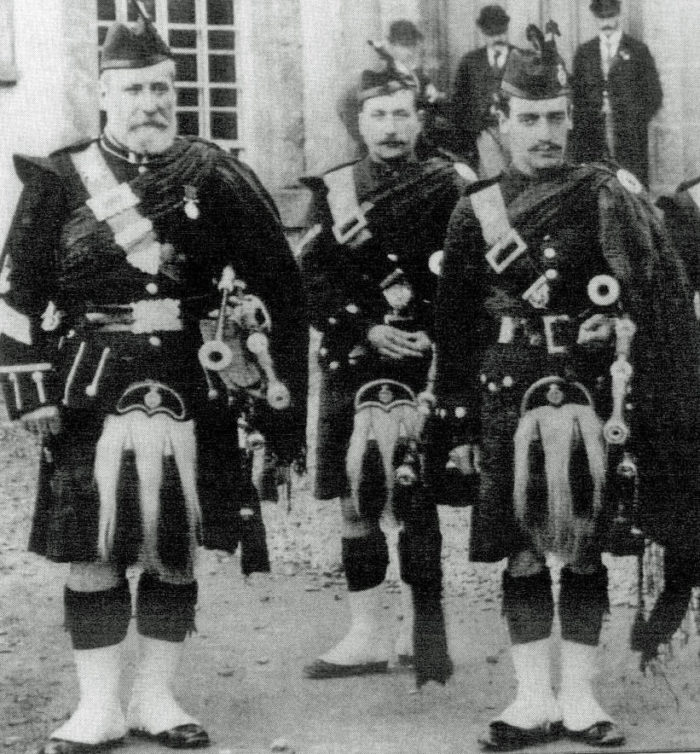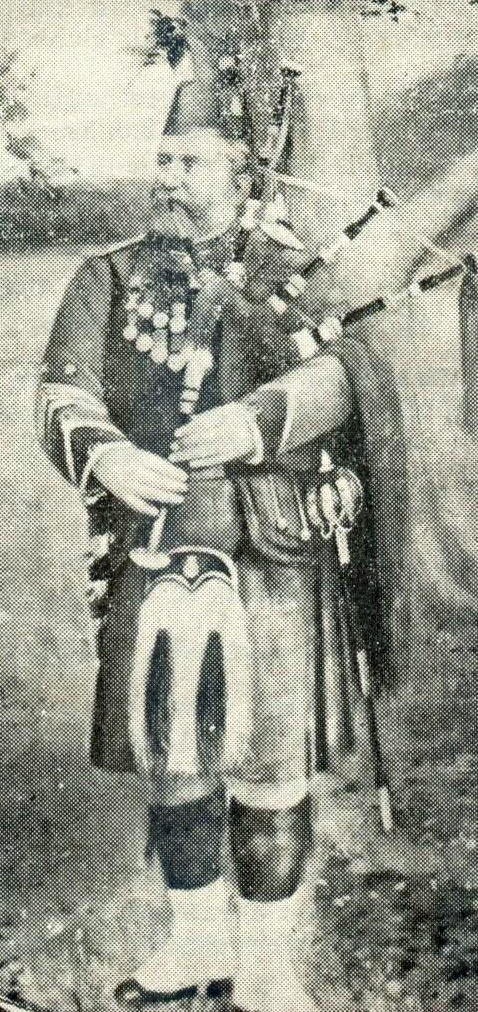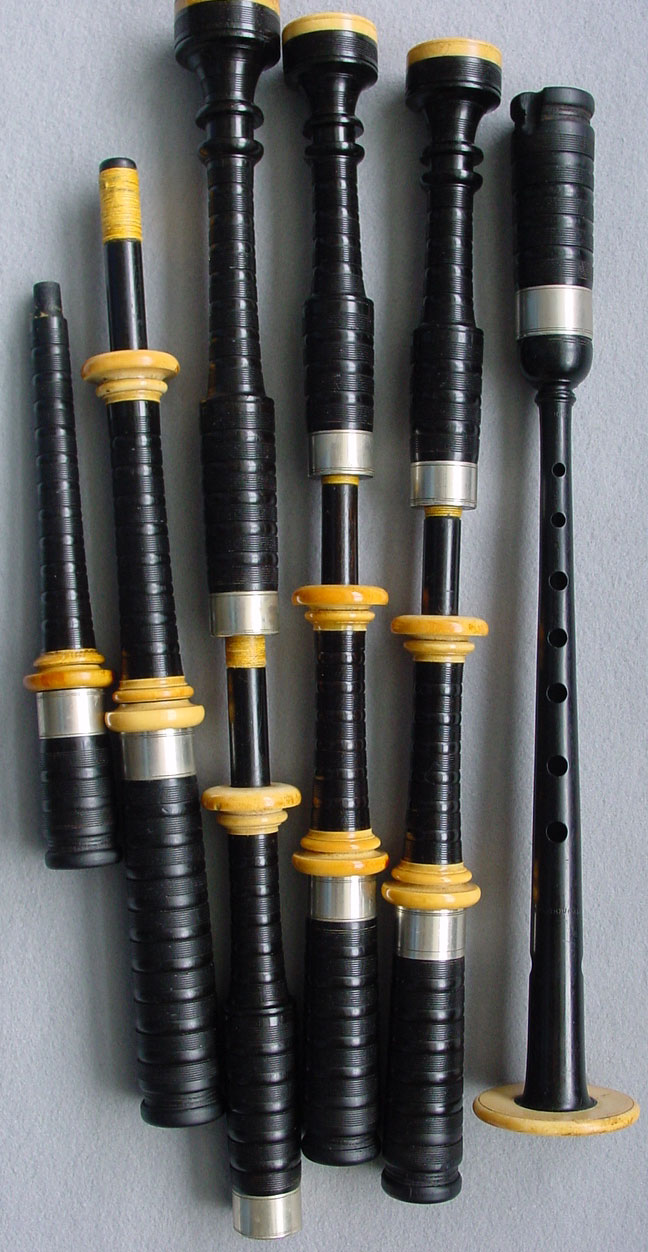Duncan MacDougall
(1837-1898)

Today, Duncan MacDougall is remembered as perhaps the premier pipemaker of his time. Few realize he was also the best piper of his generation.
He was born in Perth into a pipemaking family, his grandfather Allan having begun a pipemaking firm in 1792, and his father John taking it over around 1834. Duncan took the business over in Perth in 1857 and moved it to Edinburgh around 1861. He became pipe major of the Edinburgh Volunteers and instructor to the Black Watch volunteers. He had already begun making a name for himself as a competitor as early as age 17 when he won a first place for piobaireachd at Montrose games among some of the leading players of the day.
So by the 1860s, he was a piping celebrity in Edinburgh, in high demand at functions. He was offered the position of assisant to the Queen’s Piper, William Ross, which he declined, though he did spend one season as Victoria’s piper at Osbourne House on the Isle of Wight. His business flourished and he was able to be quite selective in the customers for whom he made pipes.
In 1870 he won the Prize Pipe for Piobaireachd at Inverness, having made the prize pipe himself.
In 1870, he accepted a seasonal engagement as piper at Taymouth Castle after John MacDougall Gillies left in a huff and the great Robert Meldrum turned down an offer to replace him. This was a significant position, as Queen Victoria spent much of her time in Scotland here. The season went well, and Duncan MacDougall was offered the post full-time. He was able virtually to declare his own terms, which included being able to move his business to nearby Aberfeldy and to continue running it. This meant he could not be full-time at Taymouth, but the Earl of Breadalbane met the conditions around 1871 and MacDougall spent the next 14 years there.
Duncan MacDougall won the Gold Medal at Inverness in 1873. In 1876 he won the Champion’s Gold Medal as “Champion of Champions” or “King of Pipers.” The event had been held only three times previously, and the previous winners with John Ban MacKenzie (1835), Donald Cameron (1867) and Ronald MacKenzie (1873). Cearly he was among an elite few as a performer. In fact, in the memoirs of John MacDonald of Inverness, it is noted that William MacDonald (John’s uncle, and piper to the Prince of Wales) called Duncan MacDougall “the greatest all-round piper of his day.”
 As a pipemaker, Duncan MacDougall is regarded by many as the best ever. His combination of craftsmanship, style and tone has rarely been equalled, and even in his day his supply of instruments could barely keep up with the demand. He made Highland pipes and Border pipes mostly in ebony and cocuswood, often using sea ivory mounts as well as elephant ivory, nickel (then called ‘German silver’) and silver. In 1893, a female reporter visited his shop and wrote this article, which appeared in popular magazine of the day called ‘The People’s Journal’:
As a pipemaker, Duncan MacDougall is regarded by many as the best ever. His combination of craftsmanship, style and tone has rarely been equalled, and even in his day his supply of instruments could barely keep up with the demand. He made Highland pipes and Border pipes mostly in ebony and cocuswood, often using sea ivory mounts as well as elephant ivory, nickel (then called ‘German silver’) and silver. In 1893, a female reporter visited his shop and wrote this article, which appeared in popular magazine of the day called ‘The People’s Journal’:
‘People’s Journal’ transcription
Such was the success of his business that he was once able to turn down an order for 100 sets of pipes to supply the five bands of the Highland Brigade. His preference was to deal with individual pipers in person, a trait which may account for the seemingly endless customizations to his pipes.
He obtained the royal warrant “Bagpipe Makers to Her Royal Highness, Queen Victoria.” This was no dormant title, as he did in fact make pipes for the Royal Family, including for Pipe Major William Campbell, her Piper until her death, and for King Edward VII – a keen piper and composer of the slow air “Mallorca” – when he was Prince of Wales.
He was known to put quality before financial gain, and a complete Duncan MacDougall bagpipe in cocuswood or ebony is a much sought after instrument today, particularly if it displays the distinctive “Dn MacDougall” stamp.

Duncan’s sons John and Gavin would join him in the business in the 1890s and take it over when he died in 1898. Gavin won the Gold Medal at Oban in 1896 (the only time he played there), and while his instruments would also be prized the world over until his untimely death in 1911, they never equalled the near mythic quality of his father’s.
“Mrs. MacDougall” is our only known Duncan MacDougall composition, but its exceptional quality suggests there may have been others. The tune first appears in Wiliam Ross’s 1885 collection, with this four-parted 6/8 march ascribed to “Dn MacDougall.” William Ross was piper to Queen Victoria after Angus MacKay, and the two certainly knew each other Unfortunately, this was a time when all too often piping publishers did not identify the composers of tunes.
JM, May 2009
-with notes from ‘Highland Bagpipe Makers’ (2001) by Jeannie Campbell, ‘Notices of Pipers’ in Piping Times, April, 1971, and ‘Piping Times’, Janaury and February, 1964.

5 Comments
Hi i own a set of duncan macdougall pipes roughly 1860’s in full silver. Supposedly one of 6 sets made like that for pipers to queen victoria. A very beautiful sounding set of pipes. It would be interesting to know what they are actually worth.
I have a collection of MacDougal bagpipes looking for some Cocuswood or Ebony with original silver
Not many of those around, Paul. Though I do know where the primo set is. JM
Good morning,
Doing a research project on Donald MacKay, Raasay and trying to tie up some dates of others about the same time period. MacKay was Piper to Prince of Wales 1874 until his death in 1893. In 1893 Angus MacKillop. Sergeant Piper 1st Bn. Cameron Highlanders had the position temporarily. William MacDonald and Duncan MacDougall each held the position prior to MacKay. MacDougall also quite briefly. Can anybody fill in some dates ? Any help will be very much appreciated. Thank you.
I live in his old home Lorne Cottage in Aberfeldy. I have unseen photos of his old workshop too.